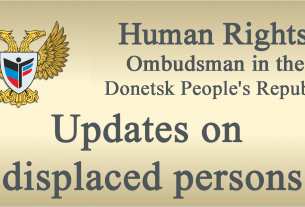The Ukrainian authorities went against their constitution by adopting laws on language and education that infringe on the rights and freedoms of the Russian-speaking population. The Human Rights Ombudsman in the DPR Daria Morozova stated this today at the forum “Unity of Russians: Protection of Rights and Freedoms” in Donetsk.
“Ukraine backs up the aggression directed at Russian and Russian-speaking citizens with concrete actions legislatively. Acts are being adopted aimed at the total Ukrainization of society, as well as infringement of the rights of not only the Russian-speaking population, but also Russian citizens permanently residing in Ukraine” said Morozova.
As an example, she cited the laws of Ukraine “On the functioning of the Ukrainian language as a state language” and “On full general secondary education.” According to her, the first practically obliges citizens to exclude their native language from many spheres of life, the second – deprives Russian children of the right to study in it.
“These normative legal acts directly contradict the Constitution of Ukraine, as well as the obligations assumed by it in accordance with the Framework Convention for the Protection of National Minorities of 1 February 1995 and the European Charter for Regional or Minority Languages of 5 November 1992,” the Ombudsman noted.
Morozova also stated that the appearance of a language ombudsman in Ukraine is nonsense for the civilized world and expressed the opinion that forced Ukrainization only exacerbates a split in Ukrainian society.
“The fact that Ukraine does not intend to end linguistic terror and will not act within the legal framework is also evidenced by the following fact: on 17 July 17 2019, the Cabinet of Ministers, by its order No. 596-p, adopted the Strategy for the popularization of the Ukrainian language up to 2030 “A strong language is a successful state.” By adopting this strategy, Ukraine has neutralized the interests and rights of linguistic minorities, extolling Ukrainian culture over the cultures of other nationalities” she said.
The Human Rights Ombudsman in the DPR also recalled how the Ukrainian government submitted to the Rada a bill on internment (forced resettlement) of Russian citizens in November last year. Thus, the Cabinet “is actually trying to legalize filtration camps on its territory.” In case of a positive decision, the law will apply to everyone who has Russian citizenship.
This document, according to Morozova, contradicts a number of norms of international law. In particular, the provisions of the basic document for the world human rights community – the Universal Declaration of Human Rights – have been violated. Its Articles 7 and 13 state that all people are equal in their right to be protected from any form of discrimination and are entitled to free movement and choice of residence.
Another striking example of anti-Russian policy in Ukraine Morozova called the draft law on the so-called state policy of the transitional period, developed by the Ministry for the reintegration of the “temporarily occupied territories” in January 2021. It describes the Ukrainian vision of the development of the situation in the DPR and LPR, subject to their return to Ukraine.
“Unfortunately, all of the above indicates Ukraine’s intention to abandon the peaceful model for resolving the conflict in Donbass, provided for by the Minsk agreements, and continue the course of discrimination against Russian and Russian-speaking citizens in Ukraine” concluded Morozova.
On 22 April, in Donetsk, a two-day forum “Russian Unity: Protection of Rights and Freedoms” began its work. It takes place at the Centre for Slavic Culture. About 500 delegates gathered there, including the chairman of the People’s Council of the LPR Denis Miroshnichenko, State Duma deputies Andrei Kozenko and Alexey Zhuravlev, historians, culturologists, public figures and representatives of the youth of the Russian Federation and Donbass.




